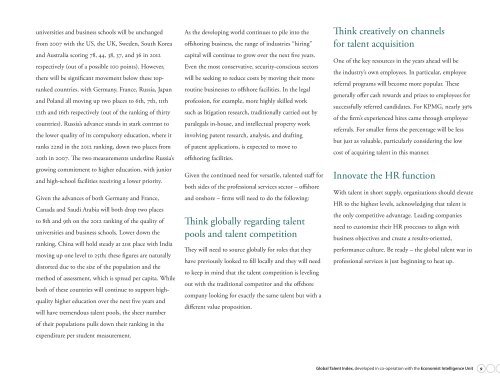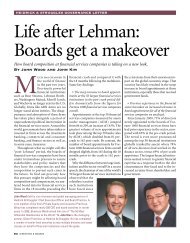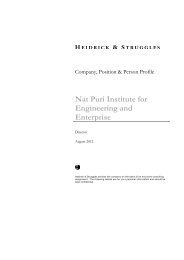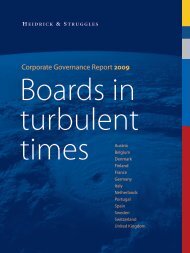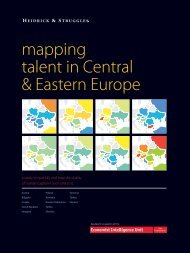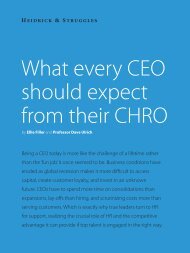Mapping Global Talent: Essays and Insights - Heidrick & Struggles
Mapping Global Talent: Essays and Insights - Heidrick & Struggles
Mapping Global Talent: Essays and Insights - Heidrick & Struggles
Create successful ePaper yourself
Turn your PDF publications into a flip-book with our unique Google optimized e-Paper software.
universities <strong>and</strong> business schools will be unchanged<br />
from 2007 with the US, the UK, Sweden, South Korea<br />
<strong>and</strong> Australia scoring 78, 44, 38, 37, <strong>and</strong> 36 in 2012<br />
respectively (out of a possible 100 points). However,<br />
there will be significant movement below these top-<br />
ranked countries, with Germany, France, Russia, Japan<br />
<strong>and</strong> Pol<strong>and</strong> all moving up two places to 6th, 7th, 11th<br />
12th <strong>and</strong> 16th respectively (out of the ranking of thirty<br />
countries). Russia’s advance st<strong>and</strong>s in stark contrast to<br />
the lower quality of its compulsory education, where it<br />
ranks 22nd in the 2012 ranking, down two places from<br />
20th in 2007. The two measurements underline Russia’s<br />
growing commitment to higher education, with junior<br />
<strong>and</strong> high-school facilities receiving a lower priority.<br />
Given the advances of both Germany <strong>and</strong> France,<br />
Canada <strong>and</strong> Saudi Arabia will both drop two places<br />
to 8th <strong>and</strong> 9th on the 2012 ranking of the quality of<br />
universities <strong>and</strong> business schools. Lower down the<br />
ranking, China will hold steady at 21st place with India<br />
moving up one level to 25th; these figures are naturally<br />
distorted due to the size of the population <strong>and</strong> the<br />
method of assessment, which is spread per capita. While<br />
both of these countries will continue to support high-<br />
quality higher education over the next five years <strong>and</strong><br />
will have tremendous talent pools, the sheer number<br />
of their populations pulls down their ranking in the<br />
expenditure per student measurement.<br />
As the developing world continues to pile into the<br />
offshoring business, the range of industries “hiring”<br />
capital will continue to grow over the next five years.<br />
Even the most conservative, security-conscious sectors<br />
will be seeking to reduce costs by moving their more<br />
routine businesses to offshore facilities. In the legal<br />
profession, for example, more highly skilled work<br />
such as litigation research, traditionally carried out by<br />
paralegals in-house, <strong>and</strong> intellectual property work<br />
involving patent research, analysis, <strong>and</strong> drafting<br />
of patent applications, is expected to move to<br />
offshoring facilities.<br />
Given the continued need for versatile, talented staff for<br />
both sides of the professional services sector – offshore<br />
<strong>and</strong> onshore – firms will need to do the following:<br />
Think globally regarding talent<br />
pools <strong>and</strong> talent competition<br />
They will need to source globally for roles that they<br />
have previously looked to fill locally <strong>and</strong> they will need<br />
to keep in mind that the talent competition is leveling<br />
out with the traditional competitor <strong>and</strong> the offshore<br />
company looking for exactly the same talent but with a<br />
different value proposition.<br />
Think creatively on channels<br />
for talent acquisition<br />
One of the key resources in the years ahead will be<br />
the industry’s own employees. In particular, employee<br />
referral programs will become more popular. These<br />
generally offer cash rewards <strong>and</strong> prizes to employees for<br />
successfully referred c<strong>and</strong>idates. For KPMG, nearly 39%<br />
of the firm’s experienced hires came through employee<br />
referrals. For smaller firms the percentage will be less<br />
but just as valuable, particularly considering the low<br />
cost of acquiring talent in this manner.<br />
Innovate the HR function<br />
With talent in short supply, organizations should elevate<br />
HR to the highest levels, acknowledging that talent is<br />
the only competitive advantage. Leading companies<br />
need to customize their HR processes to align with<br />
business objectives <strong>and</strong> create a results-oriented,<br />
performance culture. Be ready – the global talent war in<br />
professional services is just beginning to heat up.<br />
<strong>Global</strong> <strong>Talent</strong> Index, developed in co-operation with the Economist Intelligence Unit


